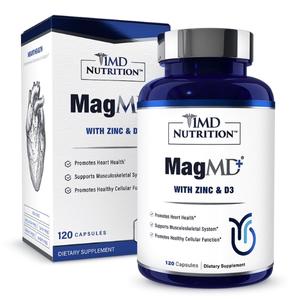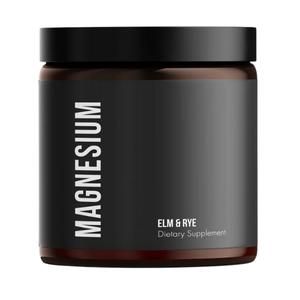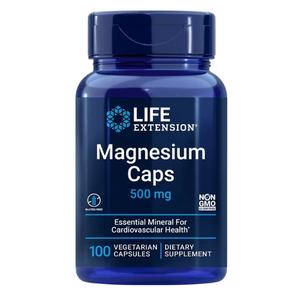 Expert's opinion
Expert's opinion
The article is a subjective view on this topic written by writers specializing in medical writing.
It may reflect on a personal journey surrounding struggles with an illness or medical condition, involve product comparisons, diet considerations, or other health-related opinions.
Although the view is entirely that of the writer, it is based on academic experiences and scientific research they have conducted; it is fact-checked by a team of degreed medical experts, and validated by sources attached to the article.
The numbers in parenthesis (1,2,3) will take you to clickable links to related scientific papers.
Best Magnesium Supplements For Sleep in 2024
All articles are produced independently. When you click our links for purchasing products, we earn an affiliate commission. Learn more about how we earn revenue by reading our advertise disclaimer.

1MD MagMD Plus
- The magnesium supplement is made using natural ingredients
- A magnesium supplement is GMO, peanut, wheat, and dairy-free

Elm & Rye Magnesium
- Third-party tests made using quality ingredients
- No need for refrigeration

Life Extension Magnesium Caps
- Designed for daily intake of vegetarian
- The magnesium supplement is GMO and gluten-free
Lack of proper sleep is a stressful condition that can leave you drained and dull all the time. Poor sleep may be due to low magnesium in your body. However, you can supplement the mineral with magnesium for sleep.
These dietary supplements will give you an ample supply of magnesium and may help improve your sleep cycle.
Best Magnesium Supplements For Sleep on the market in (April. 2024)
- 1MD MagMD Plus – Editor’s Choice
- Elm & Rye Magnesium – Best for Bone Health
- Life Extension Magnesium Caps – Best for Improving Deep Sleep
- Live Conscious MagWell – Best for 2-Month Dosage
- Klean Athlete Klean Magnesium – Best for Athletes
What Is Magnesium?
Body functions require essential elements from food, water, and supplements. One of these crucial minerals that your body needs is magnesium.
Magnesium plays a whole host of roles in the human body. It’s among the essential minerals that all your organs need for proper function. The mineral’s top job is regulating blood flow in the body and ensuring proper heart rhythm.
But, it’s also a key player in quality rest and sleep. Every person needs to maintain proper magnesium levels for deep and restful sleep. It also boosts bone, mental, and heart health.
There are different forms of magnesium that you can take as supplements, such as magnesium sulfate, chelated magnesium, magnesium citrate, magnesium malate, and others.
Read on and learn about this essential mineral’s role in achieving quality sleep.
What To Consider The Best Supplement For Sleep
Which form of magnesium is best for sleep and anxiety? The best form of magnesium for sleep is magnesium citrate. It’s the best magnesium supplement because your body has an easy time absorbing it. Magnesium citrate is one of the most common ingredients in magnesium supplements.
A study[1] was performed on 46 adults to see how magnesium citrate is absorbed by the body. The results showed that the best form of magnesium is magnesium citrate as opposed to magnesium oxide because of the increased bioavailability of the citrate molecule.
5 Best Magnesium Supplements For Sleep and Anxiety in 2024
1MD MagMD Plus
This supplement supports the overall body and mental health. Taking them ensures you have better sleep cycles and can enjoy deeper sleep.
- Made using natural ingredients
- It’s free of genetically modified organisms or GMO, peanut, wheat, and dairy-free
- Contains magnesium citrate, magnesium malate, and magnesium glycinate)
- The supplement is RSPO certified (Roundtable of Sustainable Palm Oil)
- The supplement capsules are fragile
- The product can cause headaches and stomach upset
1MD MagMD Plus helps improve your sleeping patterns and has numerous other health benefits.
Taking the supplement helps support your immunity. The product contains Zinc and Vitamin D3 that work together to support immune responses. That way, you have better protection against environmental threats.
It promotes better heart health[2], thus shielding you from cardiovascular diseases. Better heart activity coordination and function are due to better enzyme activity.
Regular magnesium intake will see you also benefit from bone and muscle strength. Magnesium intake is crucial since it supports better calcium absorption. It helps the body have better bone health and stronger muscles.
Lastly, this supplement promotes better brain function. This is thanks to the magnesium and zinc that aid neurotransmitter activity. As a result, you have a better cognitive function[3] and mood.
Elm & Rye Magnesium
The supplement contains high-quality dietary magnesium that your body needs for different functions. This daily magnesium supplement is made under the best production processes and is safe for human consumption.
- Third-party tested
- It’s made using quality ingredients
- You don’t have to refrigerate the supplements
- The product is in easy-to-swallow tablet form
- You can experience headaches while taking the tablets
- The product can have a laxative effect
Enjoy better sleep by taking the supplement crucial, which supports more than 300 enzyme reactions. As a result, you can enjoy normal blood pressure and a steady heart rhythm. It’s also worth noting that the magnesium supplement is crucial in supporting healthy blood sugar levels.
Regular magnesium intake ensures better bone health and formation[4] in your body. Vitamin D and calcium level regulation benefit your skeletal structure. These are 2 of the most crucial nutrients for bone health.
The form of magnesium is magnesium gluconate present in amounts of 30 milligrams (mg) per serving. The Recommended Dietary Allowance[5] for magnesium is 310-320 for women and 400-420 for men, so this is not a very large dose of magnesium.
People with different heart conditions can take these magnesium supplements under the supervision of a physician. The magnesium in each tablet helps your heart maintain a steady beat and regulates blood pressure. This nutrient’s role in overall heart health is worth noting since it is essential for distributing electrolytes to cells.
This is an ideal supplement to take if you have a magnesium deficiency. It’s safe for daily use but requires physician supervision when taken with other medication.
Life Extension Magnesium Caps
The supplement contains three different kinds of magnesium for proper body health. Regular intake is ideal for sleep efficiency and boosting restorative sleep.
- These are vegetarian capsules for daily intake
- It’s GMO and gluten-free
- The capsules contain magnesium succinate, magnesium oxide, and magnesium citrate
- All the magnesium capsules and unflavored
- Regular intake may cause stool softening and diarrhea due to magnesium oxide.
- The product can lead to nausea and cramps
- Contains more than the tolerable upper limit established by the Institute of Medicine (IOM)
The magnesium caps ensure your body gets to enjoy better heart health. Magnesium intake plays a crucial role in smoothening the blood vessel muscles. This, in turn, encourages healthy blood flow[6] throughout your body. It’s also ideal for maintaining healthy blood pressure and promoting healthy endothelial function.
Life Extension has been in business for four decades, making healthy and safe to consume supplements. This company maintains the highest standards and ensures only natural healthy ingredients make up the magnesium formulation.
Regular intake is also beneficial for better bone health. It also leads to proper muscle function essential for daily mobility. Magnesium helps to improve overall mobility and lessen the bone loss. The bones are known to have the highest magnesium concentration in the body.
One vegetarian cap contains a whopping 500 mg of magnesium, more than the tolerable upper limit of 350 mg from supplements. High-dose supplements can cause nausea, diarrhea, and cramping in some individuals.
Live Conscious MagWell
The product comes in a larger bottle with 120 capsules that you can take for two months. It’s ideal for boosting the overall body and mental health.
- It contains essential vitamin D3 and Zinc
- The bottle contains 120 capsules, enough for two months’ daily dietary intake
- It’s ideal for bone and heart health
- It contains magnesium citrate, magnesium glycinate, and magnesium malate
- The product lacks proper third-party testing information or reports
- The capsules have an off-putting taste
Magnesium, vitamin D3, and zinc in this product benefit the body in various ways. This is an ideal magnesium supplement for boosting bone and muscle health in the body. Plus, it boosts proper calcium absorption.
In addition, the supplement has antioxidant properties. These are instrumental in maintaining proper heart health and boosting blood flow in your body.
It’s easier to fight off magnesium deficiency with daily magnesium consumption. The supplements contain magnesium citrate[7] that’s easy for your body to absorb. The dosage is 225 mg of magnesium, 7.5 mg of zinc (68% of the daily value or DV), and 1000 IU of Vitamin D (125% DV).
Klean Athlete Klean Magnesium
Enjoying deep and restful sleep is among the benefits of this magnesium supplement. It contains no additives.
- It’s National Sanitation Foundation (NSF) certified for sports
- It’s an unflavored product
- It’s non-GMO, wheat, and gluten-free.
- The product contains no artificial colorings or additional flavorings
- It boosts energy production in the body
- It can cause migraine headaches
- Daily intake causes nausea and cramps
Daily intake of supplements helps athletes in different ways[8]. First, they can enjoy having more energy when practicing or playing different sports. Second, these supplements are a great help in muscle contracting and relaxing during workouts.
Athletes can benefit from supplements that are free from harmful additives or flavorings. There’s no artificial coloring, GMO, or gluten in the product, so it’s safe to consume for vegetarians.
Klean Athlete is a third-party tested product and NSF certified for sports programs. It helps boost and maintain peak performance and improves focus through maintaining ideal brain health.
Magnesium glycinate is the form used in this product at 120 mg per serving; it is the ideal dosage for restful sleep. Restful sleep helps muscles regenerate and gain strength.
How Does Magnesium Aid Sleep?
Taking magnesium supplements for sleep can be a lifesaver, especially when you have disruptive sleep cycles. Millions of people[9]worldwide have difficulty sleeping long enough to get proper rest. Fortunately, one way to help you get quality sleep is by taking supplements.
The supplements have ingredients such as magnesium chloride, magnesium oxide, magnesium citrate, and magnesium glycinate. This mineral serves many important functions[10] in your body and is responsible for overall heart and bone health.
Taking magnesium supplements is beneficial since it’s one of the most prevalent minerals the body requires Over 300 cellular reactions[11] depend on magnesium in different body parts.
It’s important to note that all the organs in your body need magnesium to function properly. Therefore, having magnesium deficiency can result in serious health complications[12]. Some of the most popular health benefits of magnesium include:
- Better sleep
- Bone health
- Heart health
- Improved muscle function
- Anti-inflammation
- Brain health
While you can get magnesium from food[5] after eating a balanced diet, taking supplements helps prevent deficiency. Magnesium promotes sleep, so you won’t have to battle sleep disorders or similar conditions. And low magnesium levels make vitamin D ineffective, so the dangers of deficiency are widespread.
When thinking about the health benefits of magnesium supplements for quality sleep, know that it helps your brain and body to relax. Falling asleep is impossible if your brain and body can’t calm down. Magnesium helps activate the parasympathetic nervous system and relaxes and calms[13] your body and brain.
Having magnesium in your body will help regulate neurotransmitters and melatonin. Melatonin is responsible for the body’s sleep-wake cycle[14].
There’s also the added advantage of toning down nerve activity when it’s time to rest and fall asleep. This is possible through magnesium binding to GABA (Gamma-Aminobutyric Acid), a neurotransmitter in charge of slower nerve activity[15] in the body.
Since magnesium has a crucial role in the body, magnesium deficiency affects sleep[16] quality. Folks with such a condition may have insomnia or lack quality sleep. The standard diet contains only about 50 percent[17] of what Americans need regarding magnesium levels.
Some specific people run a high risk of magnesium deficiency, including
- Older adults who have different dietary needs limit their intake of specific foods. That creates an opportunity to have lower magnesium levels[18] in the body.
- People with digestive disorders- The only way the body can benefit from magnesium is if proper absorption is possible. Folks with digestive complications may not be able to absorb the right amount of magnesium.
- Diabetes patients: The body loses a high amount of magnesium when you have diabetes. This is because of the presence of conditions like insulin resistance.
- Alcohol dependency- An alcoholic or alcohol-dependent person has a high risk[19] of suffering from magnesium dependency.
It’s important to find ways to increase your magnesium intake if you fall into any of these categories. That is one of the best ways to ensure you enjoy quality sleep daily. In fact, this mineral is responsible for regulating your sleep, so you need it to achieve restful sleep[20].
In a study[20] involving a group of 500 older adults, some people were given 500 mg of magnesium, while the rest got a placebo.
The results showed that the group that got the 500 mg of magnesium experienced better sleep. They had a higher level of melatonin and renin, which play a crucial role in sleep regulation. Taking supplements helped improve sleep quality and overall sleep efficiency.
Another study[21] was done on mice to prove the effect of magnesium deficiency. The mice ended up showing signs of restlessness and disruptive sleep cycles. This was because magnesium has a crucial influence on the nervous system.
Overall, better sleep is essential to a productive and happy life. This is why taking supplements may also play a role in alleviating depression and anxious behavior. It’s impossible to enjoy quality sleep when you’re anxious and depressed.
Magnesium is an essential mineral that the body needs for sleep. When you fall into deep sleep and rest, even your mood is better after you wake up. Some studies[22] show magnesium can be a potential form of alternative treatment when you suffer from anxiety and depression.
Dosage & Precautions
Magnesium supplements are a great way of ensuring you maintain proper magnesium levels in the body. But, it’s essential to know the proper dosage to take every day and any precautions that you must keep in mind.
A daily dietary intake[23] of 310 to 360 mg of magnesium is ideal for adult women. On the other hand, adult men can take 400 to 420 mg. Water and food are great natural sources of magnesium for the body. So, consider boosting your diet with magnesium-rich foods such as avocados, nuts, legumes, tofu, whole grains, fatty fish, and bananas.
Apart from that, you can take supplements but do so under the supervision of your physician. This is especially crucial if you’re taking medication for different conditions like sleep disorders and cardiovascular disease.
Always ensure you keep up with the right dosage and avoid overdoing it. There are also some side effects that you may experience when you take a magnesium supplement every day like
- Diarrhea
- Cramps
- Nausea
- Headaches
Taking large doses of magnesium leads to a buildup in the body. This puts you at risk of issues such as
- Low blood pressure
- Slowed breathing
- Irregular heartbeat
- Confusion
- Coma
- Death
There’s also the risk of magnesium interaction with specific medication. So, be cautious if you take blood pressure medicine, antibiotics, or muscle relaxers. Always speak with your doctor in such instances or if you suffer from a health condition.
You should avoid magnesium oxide as it’s a stool softener that will do more harm than good to alleviate your sleeping disorder. It is also not very bioavailable and does not get into your bloodstream as effectively as other forms.
Conclusion
Magnesium is an essential mineral that your body needs for better sleep. This means that taking magnesium supplements is one of the ideal ways to improve sleep quality. Having magnesium deficiency hurts sleep cycles and can even lead to sleep disorders.
The mineral is a major player in many body reactions and organ functions. It’s also essential in helping calm your body and mind to enjoy deep and restful sleep.
Many foods contain magnesium that you can add to have a balanced diet. But, taking supplemental magnesium can also help maintain proper magnesium levels in the body. Daily intake of magnesium supplements for sleep is good, but note the side effects of this essential nutrient.
Frequently Asked Questions
Yes, it’s safe to take magnesium supplements daily as part of your dietary needs. However, a drug interaction is possible if you have any health conditions or are taking other medication. So, consult your doctor before taking magnesium tablets or capsules to promote sleep. It is also possible to take too much magnesium, so check the bottle for dosages.
When you have a magnesium deficiency, you exhibit symptoms such as muscle cramps and twitches, mood disorders, mental health challenges, osteoporosis, muscle and overall body weakness, fatigue, anxiety, depression, lack of sleep, and high blood pressure.
The first thing in the morning is the best time to take magnesium supplements. It gives your body time to process the mineral and ensure proper absorption. That way, you can enjoy the day and sleep better at night.
Magnesium doesn’t induce insomnia. Magnesium supplementation helps resolve such sleep disorders. That way, you can enjoy deeper and restful sleep that’s easy to come by at the end of the day.
Putting aside the magnesium supplements is better if you’re on any other medication. Medications like antibiotics, blood pressure medicine, and muscle relaxers result in drug interaction. People with health conditions like cardiovascular disease, serious mental health problems, diabetes, intestinal illnesses, and kidney disease[24] must consult their physician before taking magnesium supplements.
+ 24 sources
Health Canal avoids using tertiary references. We have strict sourcing guidelines and rely on peer-reviewed studies, academic researches from medical associations and institutions. To ensure the accuracy of articles in Health Canal, you can read more about the editorial process here
- Walker, A. F., Marakis, G., Christie, S., & Byng, M. (2003). Mg citrate was found more bioavailable than other Mg preparations in a randomized, double-blind study. Magnesium Research, 16(3), 183–191.
- Rosique-Esteban, N., Guasch-Ferré, M., Hernández-Alonso, P., & Salas-Salvadó, J. (2018). Dietary Magnesium and Cardiovascular Disease: A Review with Emphasis in Epidemiological Studies. Nutrients, 10(2), 168. https://doi.org/10.3390/nu10020168
- Al-Ghazali, K., Eltayeb, S., Musleh, A., Al-Abdi, T., Ganji, V., & Shi, Z. (2020). Serum Magnesium and Cognitive Function Among Qatari Adults. Frontiers in aging neuroscience, 12, 101. https://doi.org/10.3389/fnagi.2020.00101
- Castiglioni, S., Cazzaniga, A., Albisetti, W., & Maier, J. A. (2013). Magnesium and osteoporosis: current state of knowledge and future research directions. Nutrients, 5(8), 3022–3033. https://doi.org/10.3390/nu5083022
- Harvard T.H. Chan. (2019). Magnesium (2019). Available at: https://www.hsph.harvard.edu/nutritionsource/magnesium/#:~:text=RDA%3A%20The%20Recommended%20Dietary%20Allowance,cause%20harmful%20effects%20on%20health.
- Houston M. (2011). The role of magnesium in hypertension and cardiovascular disease. Journal of clinical hypertension (Greenwich, Conn.), 13(11), 843–847. https://doi.org/10.1111/j.1751-7176.2011.00538.x
- Kappeler, D., Heimbeck, I., Herpich, C. et al. (2017). Higher bioavailability of magnesium citrate as compared to magnesium oxide was shown by evaluation of urinary excretion and serum levels after single-dose administration in a randomized cross-over study. BMC Nutr 3. https://doi.org/10.1186/s40795-016-0121-3
- Zhang, Y., Xun, P., Wang, R., Mao, L., & He, K. (2017). Can Magnesium Enhance Exercise Performance?. Nutrients, 9(9), 946. https://doi.org/10.3390/nu9090946
- Chattu, V. K., Manzar, M. D., Kumary, S., Burman, D., Spence, D. W., & Pandi-Perumal, S. R. (2018). The Global Problem of Insufficient Sleep and Its Serious Public Health Implications. Healthcare (Basel, Switzerland), 7(1), 1. https://doi.org/10.3390/healthcare7010001
- Al Alawi, A. M., Majoni, S. W., & Falhammar, H. (2018). Magnesium and Human Health: Perspectives and Research Directions. International journal of endocrinology, 2018, 9041694. https://doi.org/10.1155/2018/9041694
- de Baaij, J. H., Hoenderop, J. G., & Bindels, R. J. (2015). Magnesium in man: implications for health and disease. Physiological Reviews, 95(1), 1–46. https://doi.org/10.1152/physrev.00012.2014
- DiNicolantonio, J. J., O’Keefe, J. H., & Wilson, W. (2018). Subclinical magnesium deficiency: a principal driver of cardiovascular disease and a public health crisis. Open heart, 5(1), e000668. https://doi.org/10.1136/openhrt-2017-000668
- Wienecke, E., & Nolden, C. (2016). Langzeit-HRV-Analyse zeigt Stressreduktion durch Magnesiumzufuhr [Long-term HRV analysis shows stress reduction by magnesium intake]. MMW Fortschritte der Medizin, 158(Suppl 6), 12–16. https://doi.org/10.1007/s15006-016-9054-7
- Durlach, J., Pagès, N., Bac, P., Bara, M., & Guiet-Bara, A. (2002). Biorhythms and possible central regulation of magnesium status, phototherapy, darkness therapy, and chronopathological forms of magnesium depletion. Magnesium Research, 15(1-2), 49–66.
- Poleszak E. (2008). Benzodiazepine/GABA(A) receptors are involved in magnesium-induced anxiolytic-like behavior in mice. Pharmacological reports: PR, 60(4), 483–489.
- Boomsma D. (2008). The magic of magnesium. International journal of pharmaceutical compounding, 12(4), 306–309.
- Karlovitch, S. (2020). Study: Half of All Americans are Magnesium Deficient, Pharmacy Times. Available at: https://www.pharmacytimes.com/view/study-half-of-all-americans-are-magnesium-deficient
- Barbagallo, M., Veronese, N., & Dominguez, L. J. (2021). Magnesium in Aging, Health, and Diseases. Nutrients, 13(2), 463. https://doi.org/10.3390/nu13020463
- Poikolainen, K., & Alho, H. (2008). Magnesium treatment in alcoholics: a randomized clinical trial. Substance abuse treatment, prevention, and policy, 3, 1. https://doi.org/10.1186/1747-597X-3-1
- Abbasi, B., Kimiagar, M., Sadeghniiat, K., Shirazi, M. M., Hedayati, M., & Rashidkhani, B. (2012). The effect of magnesium supplementation on primary insomnia in elderly: A double-blind placebo-controlled clinical trial. Journal of research in medical sciences: the official journal of Isfahan University of Medical Sciences, 17(12), 1161–1169.
- Depoortere, H., Françon, D., & Llopis, J. (1993). Effects of a magnesium-deficient diet on sleep organization in rats. Neuropsychobiology, 27(4), 237–245. https://doi.org/10.1159/000118988
- Boyle, N. B., Lawton, C. L., & Dye, L. (2016). The effects of magnesium supplementation on subjective anxiety. The effects of magnesium supplementation on subjective anxiety. Magnesium Research, 29(3), 120–125. https://doi.org/10.1684/mrh.2016.0411
- Jahnen-Dechent, W., & Ketteler, M. (2012). Magnesium basics. Clinical kidney journal, 5(Suppl 1), i3–i14. https://doi.org/10.1093/ndtplus/sfr163
- Harvard Health Publishing. (2017). What you should know about magnesium – Harvard Health. Available at: https://www.health.harvard.edu/staying-healthy/what-you-should-know-about-magnesium2.





